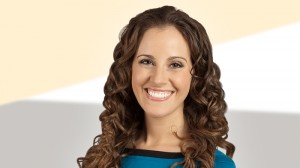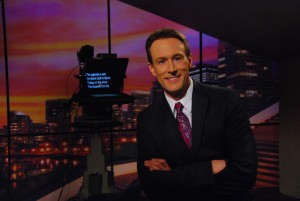Social media is more than just being social
Guest commentary
Louise Houghton, Television Host at DW
 Facebook, Twitter, Instagram, Tumblr, Circle, LinkedIn…
Facebook, Twitter, Instagram, Tumblr, Circle, LinkedIn…
It’s hard to try and keep up with them all. Even now I am thinking that I must change my Twitter settings because I have been hacked and am sending out adverts to my 500 followers!
People say that it sometimes feels like another job making sure that everything on their social media platforms is current. Of course, everyone wants to be the first to post about the new presenter seen on DW or the opening of a new store in Berlin, for example. This is how news gets around nowadays and wouldn’t it be great if it was you who started a “Twitter trend”! There is no denying that Journal and newspapers offer a more detailed account of world events, but the likes of Twitter actually get the information out to the world much quicker. It is now possible to communicate without even using words – all you have to do is post a picture and that says it all. What an ingenious idea Instagram is! It saves me typing, but then I spend double the amount of time tweaking photos and putting them into little collages before I actually upload them.
Is it all really necessary? Are we doing it for ourselves or for our friends and followers who take an interest in what we do? We didn’t have it before, so why now the sudden interest in what dinner your friend is eating tonight? Furthermore, why is there a need to post a photo to clarify the fact that they have actually cooked it themselves?
I often wonder what we did before these sites were accessible with the touch of a button. Those precious seconds were probably spent taking life a little bit easier. We probably felt like we were able to relax before going off to sleep at night rather than thinking we need to write one last status update and say goodnight to the world.
These sites can also intrude on people’s personal lives too. Those who have millions of followers need to keep them happy by constantly posting something. But the reality is, as I mentioned above, that it is just too time consuming so they have someone else who takes charge of their social media presence for them. It is not surprising that there are stories of stalkers and burglaries as a result of these sites either because the world knows where you are or where you are not as soon as you check in on Facebook!
Saying all that, no one can deny that there are benefits to having speedy access to all this information, especially if you have a smartphone. When I am working away from home it is great to be able to keep up to date with what my friends are doing and see pictures of their birthdays, children and holidays. It makes the world feel a bit smaller and that you are still part of each other’s lives even though there is distance between you. The number of people now living away from home has, no doubt, increased since the invention of social media, Skype and Facetime.
Not only does social media help on a social front but these mediums allow people to promote themselves or their companies with minimal costs. Small businesses have the ability to promote events they are holding by posting links on feeds with followers and that is a great advantage. The Internet means that headlines get around the world faster than the speed of sound. Whether it is news on who won the latest series of “I’m a celebrity get me out of here” or the horrific pictures of a tsunami, you only need to log in to your social media sites to see the information there in front of you because everyone will be talking about it. It’s quicker and easier than a search engine. This helps to educate nations without them even realising they are being educated. I believe there were a number of people researching Nelson Mandela after he died because of following posts, blogs, tweets and captions of his quotes on social media sites. This can only be a good thing – news is more accessible through these sites and becomes more a topic of discussion rather than just a headline. Our understanding and knowledge of historical events will be stronger as a result.
Like many things in life social media has its pros and cons and I have barely scratched the surface on the many topics of conversation based around this ever-growing medium. One thing is for sure though, technology will continue to shape our world and we can’t stop it, so I think it is best to jump on the bandwagon and enjoy what these sites have to offer. Otherwise you risk getting left behind not knowing what a hashtag means! #justsaying #socialmedia
The beginning of an affair
Guest commentary
Laila Harrak, Television Host at DW
Remember the sensational headlines about a NASA astronaut blasting off on an epic 1,400 km cross-country road trip to kidnap a romantic rival? Her meltdown made for a compelling story and an endless stream of tabloid puns. If love can do that to a person subjected to more psychological screening tests than anyone in the world, what does that mean for the rest of us? She isn’t the only lover-turned-stalker that captured the imagination of the world. Rock band the Police had a massive hit with “Every Breath You Take,” aka the perfect stalker song, which makes surveillance, lurking in the shadows to watch a love interest sound deceptively romantic, instead of plain creepy.
Ah, the stuff of romance…
This isn’t an exploration of the highs and lows of matters of the heart. What got me thinking about love and loss, friendship and – that other sentiment that is as old as time – betrayal – was the cover of a weekly German newspaper. “Goodbye, Freunde!” read the headline on the front page of Die Zeit emblazoned with a broken heart as metaphor for a ruptured relationship between Germany and the U.S. – or at least that’s the paper’s take on recent leaks of American spying operations on its allies.
As I write this, Germany is still reeling from details disclosed by Edward Snowden about the National Security Agency’s worldwide surveillance programs that allegedly gather phone records and track Internet activity. When German newsmagazine Der Spiegel broke the story that Chancellor Angela Merkel’s personal cellphone had been allegedly tapped, its scoop revealed that as far as the NSA is concerned – nobody is above suspicion.
From the start German media covered the agency’s controversial wiretapping practices relentlessly and information revealed by the NSA whistleblower continue to dominate the news cycle. Gripped by controversy over who knew what, when and where, fierce debates have erupted and most reflect the sensibilities of a country and a public fiercely protective of privacy rights. A recent poll conducted by public broadcaster ARD revealed the German public is not feelin’ the love and trust in the U.S. is at a record low.
The NSA spying scandal was the story of the month and is shaping to become the story of the year, if not the decade. And although reports rife with accusations about scheming and counter-scheming, beyond the pale practices and dueling visions of the world – this story transcends countries, governments and boundaries and the outcome affects everybody.
Whether you live in Bombay, Berlin or Bogota, this story taps into the implications of connectivity and the privacy we have all lost in a digital era where our devices are now our stalkers. And just as the story continues to unspool with each revelation, DW as an international broadcaster with a unique perspective recognizes this is a defining story of our time. Not only does it capture our zeitgeist and some of the biggest challenges facing us all when it comes to privacy sharing information online, but also how government deals with data.
The good news is that DW’s focus is to inform an international audience providing sober and detailed analysis. We ask probing questions and delve into issues that have far-reaching social and ethical ramifications. So no matter where you are, we’ve got this story covered.
You can catch Laila on Business Brief and World Stories.
Reaching African youth with educational radio
Guest commentary
Maja Braun, Coordinating Editor, Programs for Africa
 Along with providing global audiences with quality news and information, we think international broadcasters should also be responsible for education, especially on social issues and topics that are a part of what Deutsche Welle stands for, such as democracy, civil rights and intercultural dialogue. And that is why we are always looking for new, innovative ways to make education work in different regions around the world – like, for example, in Africa.
Along with providing global audiences with quality news and information, we think international broadcasters should also be responsible for education, especially on social issues and topics that are a part of what Deutsche Welle stands for, such as democracy, civil rights and intercultural dialogue. And that is why we are always looking for new, innovative ways to make education work in different regions around the world – like, for example, in Africa.
Unlike other regions around the globe that have seen FM, shortwave and AM lose tremendous amounts of users in the last 15 years, radio has remained very important to people in Africa looking for information. It’s a big part of the media landscape and continues to draw listeners week in and week out. We have also seen a huge boom in mobile usage – the number of subscribers has increased by at least 20 percent in each of the last five years.
When we first developed Learning by Ear in 2008, we wanted to give young Africans – even those who cannot read or access the Internet – the opportunity to get information on important issues that would improve their lives immediately and in the future. It was important for listeners to learn, but we also wanted to keep them entertained. That is why we mainly use radio dramas to deliver the message of topics that are not taught in school. Learning by Ear now plays a big role in the lives of many young people in Africa, offering radio dramas and feature stories on a variety of topics, ranging from political and societal issues to economic, health and environmental issues.
By working with mobile partners in Africa in the last few years, we have also been able to reach out to a new demographic and, hopefully, increase the level of social education among their customers. The unique, audio-based content is split up into individual series and segments – which makes it great for mobile consumption.
After five years and 42 different series with ten episodes each covering everything from health and hygiene to globalization, entrepreneurs and African success stories, we felt it was time for a change. We wanted to improve on the already successful format by providing a narrative that would help these young listeners in their daily lives; a story which accompanies them throughout the year instead of changing the scene every ten weeks.
With Crossroads Generation, we have created a Learning by Ear series which follows four characters as they confront challenges and learn from their mistakes. Listeners can get to know the characters better and will be more invested in what happens to them on the show. The episodes will deal with many issues simultaneously and the storyline will build on itself throughout the season.
The new format will also inspire young listeners to reflect on what they’ve heard and form their own opinions. One episode for example confronts teenage pregnancy and the actress decides to have an abortion. This decision is presented in a non-judgmental manner that allows for listeners to decide where they stand for themselves. There will also be a discussion platform available on Facebook where the audience can voice their ideas and opinions.
Other improvements include an online video-blog that will accompany every second episode and also adds a visual flavor to the series for the first time. The audience gets a look behind the scenes and insight into how the characters feel. The video-blog will be included on the website and Facebook page. Their will also be a Learning by Ear theme song featured in each of the program’s six languages.
We are hoping that with this new series, we will be able to win over even more listeners and give them insights into how to help shape their own lives to be successful.
Technology is shaping the market
Guest Commentary
Petra Schneider, DW’s Director of Sales and Distribution
 If you wanted to watch your favorite show 20 years ago, it was like catching a train: You had to be on-time. If you were in part of the world with limited entertainment options, maybe a global broadcaster could provide you with a trickle of content. Now fast forward to the Internet age where an endless amount of content covers literally everything imaginable. Things are changing fast and big broadcasters are constantly adapting to make as much available as possible.
If you wanted to watch your favorite show 20 years ago, it was like catching a train: You had to be on-time. If you were in part of the world with limited entertainment options, maybe a global broadcaster could provide you with a trickle of content. Now fast forward to the Internet age where an endless amount of content covers literally everything imaginable. Things are changing fast and big broadcasters are constantly adapting to make as much available as possible.
Technology has once again triumphed over geography. Producing media that can be adapted to succeed in diverse global markets is imperative as distribution and consumption have become less affected by borders. It has never been easier to access content globally and for media providers like DW, competition is growing in a market sector that was once exclusively occupied by international broadcasters.
These are some of the big issues that will be covered at this year’s MIPCOM global entertainment conference. According to MIPcube, broadcasters providing many gateways which guide and facilitate their audience’s access to content are those who will succeed. Audiences are quickly changing from passive consumers to active users who demand flexibility in choosing what and when they watch.
Internet Protocol Television (IPTV) is a medium providing on-demand content that is really set to take off— especially in developing markets. According to a study by Digital TV Research, IPTV is projected to add 98 million new subscribers globally by 2018. 71 percent of these new subscribers will be in the Asia-Pacific market.
DW has established brand recognition in markets like Asia and can play off its traditional strengths with content provided on new mediums. Programming packages that are internationally successful, such as DW Transtel, are already available on-demand but they can also be packaged to fit the growing IPTV market and even be connected with other DW media and networked by users on platforms.
The disruptive effect of social media and content sharing on broadcasters and studios should instead be seen as an opportunity. When thinking about how to best use social media, many large broadcasting companies are still stuck on the idea of a sender-receiver dichotomy. Rather than trying to create a dialogue between “us and them”, broadcasters should be providing platforms where users can network and share news, video and multimedia content. The interactivity of IPTV packages could allow for this user generated distribution and there is no reason why platforms cannot be managed by large broadcasters. The more flexible broadcasters are in distributing content with rapidly changing mediums, the more successful they will be in growing and maintaining an audience.
Brent Goff gives his take on the German elections
Guest Commentary
Brent Goff, Host of DW’s Agenda
 If you have something to say, do it now! That is the motto for Germany’s candidates in these final hours of the campaign. Voters go to the polls Sunday. I have covered every national German election since 1998, and I can say that the 2013 campaign will go down in history as the biggest sleeper of my career so far. When campaigning officially began in the summer, polls revealed most Germans were thinking more vacation than choosing a new government. We talked about political apathy a few weeks ago on my show Agenda with Brent Goff. I asked a German campaign advisor who worked on Barack Obama’s winning teams in 2008 and 2012 to explain what could grab voters’ attention.
If you have something to say, do it now! That is the motto for Germany’s candidates in these final hours of the campaign. Voters go to the polls Sunday. I have covered every national German election since 1998, and I can say that the 2013 campaign will go down in history as the biggest sleeper of my career so far. When campaigning officially began in the summer, polls revealed most Germans were thinking more vacation than choosing a new government. We talked about political apathy a few weeks ago on my show Agenda with Brent Goff. I asked a German campaign advisor who worked on Barack Obama’s winning teams in 2008 and 2012 to explain what could grab voters’ attention.
Now, election day is upon us and the latest poll shows 30 percent of voters still haven’t decided what they will do at the ballot box. An amazingly high number considering all that is at stake in this election! So this week we highlighted the major issues on Agenda.
On Sunday, I will be anchoring DW’s special coverage of the German Election 2013 beginning at 15:30 GMT. You can watch our live reporting on live stream.
Here’s my list of what to watch for–and my proof that this election will NOT be a big yawn.
1. The new Alternative für Deutschland AfD Party is THE wild card in this election. The party protests Germany’s euro crisis policy and advocates a German exit from the eurozone. Polls show it may pass the 5 percent threshold to enter parliament. That would be a symbolic slap in the face to German Chancellor Angela Merkel’s marriage to austerity and bailouts.
2. The Free Democrats FDP, the current coalition partner in Germany’s government, has become the party no one likes. Polls suggest it could get less than 5 percent of the vote on Sunday. That would prohibit entry into parliament and disqualify the party from any coalition. That would create a mega headache for German Chancellor Angela Merkel.
3. Without the FDP, the conservative CDU party of Chancellor Angela Merkel may have to join forces with its arch rival, the Social Democrats SPD, to form a grand coalition. The parties have done this before–and it didn’t work too well.
4. Last, but not least, watch the Twittersphere for what voters will say about the main candidates and their wardrobes! During the TV debate between Chancellor Merkel and her opponent Peer Steinbrück, everyone tweeted nonstop about Merkel’s necklace with the colors of the German (or Belgian) flag. Issues matter, you see.
Join me Sunday to watch the results come in. I promise there will be no yawning and plenty of adrenaline. Tweet me your thoughts @BrentGoffTV.
See you Sunday!
Check out DW’s full coverage of the German elections online.










Feedback